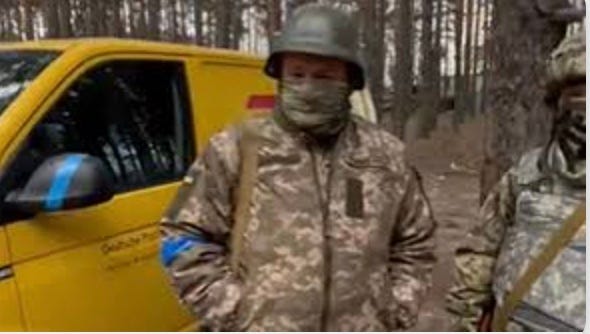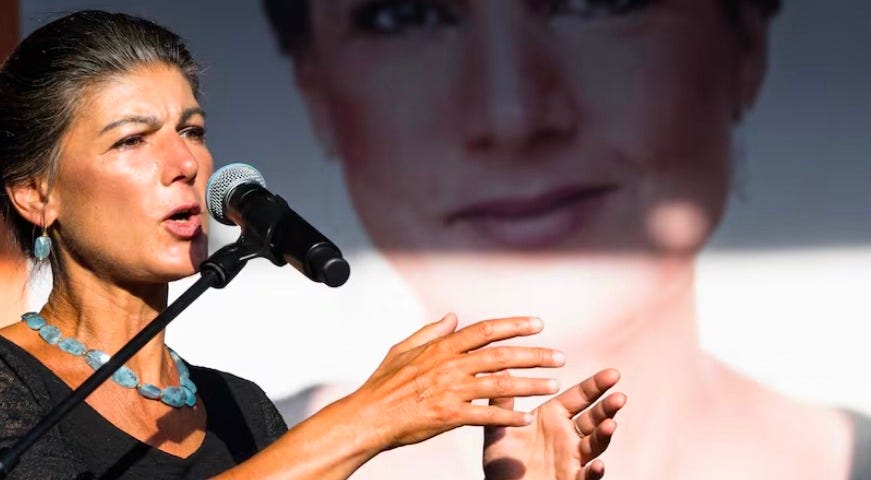Are we at war?
On Ukraine, and much else, policy-makers and politicians speak different languages
I have never known the Berlin Bubble to be so bleak. Over the past few weeks, at a series of conferences, policymakers, politicians and thinkers (plus a smattering of security folk) have been pondering the resurrection of Donald Trump and the betrayal of Ukraine.
Among the many statements I’ve heard, this one from a leading politician sticks out: ‘We are already at war with Russia, but we keep on telling our people that we are trying to keep them out of a war.’
Colourful language perhaps. But, in a country that prefers to ignore harsh realities, it was salutary to hear it. (I remember three days before Putin invaded Ukraine a senior official in the German government assured me that the American intelligence was wrong. ‘After all, they screwed up on Iraq’.)
The problem with such gatherings is that they generally preach to the converted. Among ‘the elites’ (a term devoid of self-awareness that is still used in Germany), the extent of the Putin menace is not disputed. This allows the experts to go straight into the detail.
In one forum there was much discussion about hybrid and economic warfare. As one delegate pointed out, critical infrastructure is seen by Russia as a legitimate target. Acts of sabotage, such as recently at DHL logistics hubs in Leipzig and Birmingham, were, according to some security chiefs, likely to have been coordinated and could have destroyed airliners. ‘We should be preparing for cross-functional warfare, including in space, but we are not,’ said one.
Very little of this, however, is entering the public consciousness – and not just in Germany, currently everyone’s whipping boy. French and British officials conceded, within the confines of anonymity, that the war in Ukraine was not considered their governments’ top priority.
If an actual war were taking place on our doorsteps, it would be. But it isn’t. Except that it is. It just depends on your terms of reference.
German officials talk about the need to boost their own forces to resist a possible attack ‘within five to eight years’. Currently they are nowhere close. The British Army cannot attract recruits even to fill existing gaps.
This is a circular argument ad absurdum. Amid all the fears of Trump and his promise to force peace on both sides ‘within a day’ – presumably on the terms set out by his close friend, Vladimir Putin – European policymakers talk of going it alone, knowing they might no longer be able to count on American protection.
At the same time their own parliaments debate, and nit-pick and delay, percentage-point increases in defence spending. One representative of a large corporate told a gathering that company boards were fully aware of hardware and software vulnerabilities. ‘Governments need to incentivise resilience,’ he argued. ‘Our security folk compete for precious budget increases with our marketing people, and they usually lose out.’
Niceties such as those mulled in the West do not feature in Russia, whose economy is geared fully towards war.
Back in Berlin, Paris and London, the talk ranges between vague notions of ‘peace’ and pledges to support Ukraine ‘whatever it takes’. Both assertions are flawed. The latter, as a Ukrainian delegate pointed out, compounds the suspicion that NATO sees virtue in drawing out the war as long as possible. It is as frightened of a Ukrainian victory as it is a Ukrainian defeat.
A long war benefits only Putin, with his seemingly inexhaustible supply of young men as cannon fodder, now reinforced by North Koreans. Volodymyr Zelensky, on the other hand, is having to deal with an exhausted military and frustrated civil population.
As for the term ‘peace’, this has been hijacked by Trump and the far-right as a proxy for recognition of the land already seized by Russia.
Which brings me to domestic politics. In France, the two parties of the extreme left and right, led by Jean-Luc Melenchon and Marine Le Pen, adopt the Putin line uncritically. In the UK, Nigel Farage follows the (not dissimilar) Trump playbook.
In Germany, the AfD has caused terror among the Volksparteien, the post-1945 mainstream parties. They continue to abide by the ‘firewall’, refusing to engage with it, while taking their eye off a newer and bigger danger.
That is posed by the national socialism – pun not entirely intended – of the BSW, the far-right-far-left outfit led by Sahra Wagenknecht. She is suddenly seen as a respectable political player. Foreign correspondents queue up to interview her, while some commentators, particularly on the Left, credulously indulge her.
After her strong performance in the recent elections in the three eastern states of Saxony, Thuringia and Brandenburg, she has set clear red lines with the CDU and SPD: no more military support for Ukraine and no deployment of US long-range missiles. Given that defence sits squarely with the national government, her position is reminiscent of London councils in the 80s declaring themselves nuclear-free zones.
That isn’t the point, though. What matters for her is definition. She is not fussed whether the coalition talks succeed; she sees benefits in being part of state governments and the purity of opposition. Her eye is on the big prize, the general election, due next September. With the coalition teetering on the brink, she could become a kingmaker on the federal scene sooner than that.
Putin will then have his woman in pole position. As for Trump, my next post will take in the result of the US elections.
Sorry if this sounds grim. I just wanted to pass on not what the politicians are saying, but what those in the know say is really happening.






Indeed. Completely right
An excellent piece. Thank you for stating what few politicians will - Europe is at war. How do we know reverse the direction of travel, or do we have to wait for events to make action inevitable? If it is the latter the cost will be even bigger.